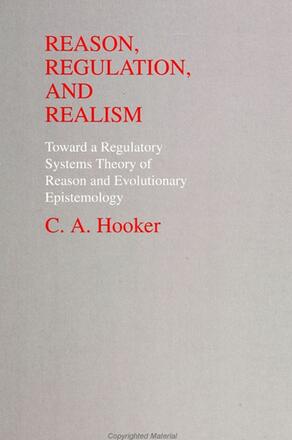Acknowledgments
1 Setting the Scene: Naturalism and the Prospects for Evolutionary Epistemology and Reason
Introduction
1.I. Evolutionary Naturalist Realism: A Philosophical Outline
1.II. Evolutionary Epistemology in a Naturalist Setting
2 Towards a Regulatory Systems Conception of Science
Introduction: Five Regulatory Systems Ideas and Their Use
2.I. A Framework for Theorizing Complex Regulatory Systems
2.I.1. The Distinction between Functional(\Informational) and Causal Systems Descriptions (Idea 1)
2.I.2. The Distinction between Populations and Individuals: Not Collections to Members but Regulatory Systems to Subsystems (Idea 2)
2.I.3. A Framework of Two Dichotomies
2.II. Cognitive Systems Dynamics for Science
2.II.1. Regulation, Invariance, and Objectivity(Idea 3)
2.II.2. Adaptation/Adaptability, Refinement/Ascent and Progress (Idea 4)
2.III. Science as an Intrinsically Social Regulatory System (Idea 5)
2.III.1. Regulation, Information, and Institutional Design
3 Reason and the Regulation of Decisions: Popper's Evolutionary Epistemology (with Bary Hodges)
Introduction and Overview
3.I. Logical Empiricism and Popperian Method: Formalism and the Control of Decisions
3.I.1. Logical Empiricism
3.I.2. Popperian Method and Logical Empiricism
3.I.3. Critique of Popperian Method
3.I.4. Control of Decisions: The Popperian Methodological Dilemma
3.II. Popper's Evolutionary Epistemology: Analysis and Critique
3.II.1. The Natural Selection of Theories
3.II.1.1. Evolutionary Continuity
3.II.1.2. Differences in Error Elimination
3.II.1.3. Error Elimination in World 3 and Plastic Controls
3.II.1.4. Unity or Schizophrenia? Popper's Problem of Evolutionary Method
3.II.2. Selection of Theories in a Symbolic Environment
3.II.2.1. Analogies, Disanalogies, and Popper's Problem
3.II.2.2. Ackermann on Selection in World 3
3.II.2.3. The Contents of World 3
3.II.2.4. Selecting Theories: the Design of Method
3.II.2.5. Conclusion
3.III. Toward a Regulatory Systems-Based Reassessment of the Significance of Popper's Philosophy
3.III.1. Problems and Lessons from PEE
3.III.2. The Control of Decisions
3.III.3. Plastic Controls and Social Rationality
3.III.4. Conclusion
4 Regulatory Systems and Pragmatism: A Critical Study of Rescher's Evolutionary Epistemology
Introduction and Summary
4.I. Thesis Pragmatism and Its Critique
4.II. Methodological Pragmatism
4.III. Presumptions, Regulative Principles, Constitutive Theses, and Justification
4.IV. Reprise and Prospect
4.V. Methodological Dynamics
4.VI. Rationality
4.VII. Regulation
4.VIII. Rescher on Evolutionary Epistemology and Method Darwinism
4.IX. Scientific Progress
4.X. Conclusion
5 Regulatory Constructivism: Jean Piaget
Introduction
5.I. Piaget's Regulatory Systems Framework
5.I.1. Piaget's Developmental Psychology and Biology
5.I.2. The Structure and Scope of Genetic Epistemology
5.I.2.1. Genetic Epistemology as Process
5.I.2.2. Piaget and Products of Processes
5.I.2.3. Processes and Universal Form
5.I.2.4. Non-naturalist Interpretations of Piaget
5.I.3. Genetic Epistemology and Evolutionary Epistemology
5.II. Piaget's Normative Epistemology
5.II.1. Introduction
5.II.2. The Status of Philosophical Construction
5.II.3. Piaget's Conception of Reason
5.II.4. The Normative Nature of Genetic Epistemology
5.II.5. Piaget: Rationalist or Naturalist?
5.II.6. Conclusion
6 Naturalized Reason
Introduction
6.I. Naturalizing Reason
6.I.1. How Not to Naturalize
6.I.2. A Perspective on Reason
6.I.2.1 The Western Rational Project
6.I.2.2 Beyond Formal Reason
6.I.3. Naturalization
6.I.3.1 Theorizing truth
6.I.3.2 Theorizing Epistemology Naturalistically
6.I.4. Putnam against Naturalized Reason
6.I.5. What Is It to Naturalize Reason?
6.II. The Nature of Reason
6.II.1. Reason, the Regulation of Judgment
6.II.2. Reason and Regulatory Ideals
6.II.3. Contexts of Rational Action
6.II.4. Reason and Efficiency
6.II.5. Naturalist Reason and Creativity
6.I1.6. Biology and Reason
6.II.7. The Historical Manifestation of Reason
6.II.8. Conclusion
Notes
Bibliography
Name Index
Subject Index
